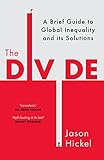The divide : a brief guide to global inequality and its solutions / Jason Hickel.
Material type: TextLanguage: English Publisher: London : William Heinemann, 2017Description: 347 pages ; 24 cmContent type:
TextLanguage: English Publisher: London : William Heinemann, 2017Description: 347 pages ; 24 cmContent type: - text
- unmediated
- volume
- 9781785151125
- 305
- HD 82 H628d 2017
| Item type | Current library | Home library | Collection | Shelving location | Call number | Copy number | Status | Date due | Barcode |
|---|---|---|---|---|---|---|---|---|---|
 Libro
Libro
|
Biblioteca Juan Bosch | Biblioteca Juan Bosch | Ciencias Sociales | Ciencias Sociales (3er. Piso) | HD 82 H628d 2017 (Browse shelf(Opens below)) | 1 | Available | 00000122118 |
Browsing Biblioteca Juan Bosch shelves, Shelving location: Ciencias Sociales (3er. Piso), Collection: Ciencias Sociales Close shelf browser (Hides shelf browser)

|

|

|

|

|
No cover image available | No cover image available | ||
| HD 82 H434t 1977 Teoría de la planificación económica | HD 82 H483m 2004 The mystery of economic growth / | HD 82 H483m 2007 El misterio del crecimiento económico / | HD 82 H628d 2017 The divide : a brief guide to global inequality and its solutions / | HD 82 H669b 1971 A bias for hope : essays on development and Latin America / | HD 82 H669c 1975 El comportamiento de los proyectos de desarrollo / | HD 82 H669d 1973 Desarrollo y América Latina : obstinación por la esperanza / |
Includes bibliographical references.
Preface. Beginnings --
pt. 1. The divide. The development delusion ; The end of poverty ... has been postponed --
pt. 2. Concerning violence. Where did poverty come from? : a creation story ; From colonialism to the coup --
pt. 3. The new colonialism. Debt and the economics of planned misery ; Free trade and the rise of the virtual senate ; Plunder in the 21st century --
pt. 4.. Closing the divide. From charity to justice ; The necessary madness of imagination.
"More than four billion people--some 60 percent of humanity--live in debilitating poverty, on less than $5 per day. The standard narrative tells us this crisis is a natural phenomenon, having to do with climate, geography, and culture. It tells us all we have to do is give aid to help poor countries up the development ladder. If poor countries would only adopt the right institutions and economic policies, they could join the ranks of the rich world. Anthropologist Jason Hickel argues that this story ignores the broader political forces at play. Global poverty--and the growing inequality between the rich countries of Europe and North America and the poor ones of Africa, Asia, and South America--has come about because the global economy has been designed over the course of five centuries to favor the interests of the most powerful nations. Global inequality is not natural, inevitable, or accidental. To close the divide, Hickel proposes dramatic action rooted in real justice: abolishing debt burdens in the global South, democratizing the institutions of global governance, and rolling out an international minimum wage, among other steps. Only then will we have a chance at a world built on equal footing."--Jacket.


There are no comments on this title.